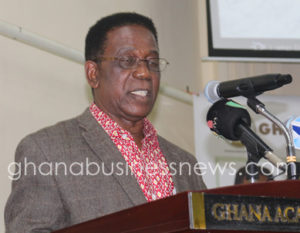African governments must recognise critical role of research – Prof. Yankah
 The Inaugural Conference of the Merian Institute for Advanced Studies in Africa (MIASA) has opened in Accra with a call on African governments to recognise the critical role of research data in the development of the continent.
The Inaugural Conference of the Merian Institute for Advanced Studies in Africa (MIASA) has opened in Accra with a call on African governments to recognise the critical role of research data in the development of the continent.
They must also bridge the gap between data and policy.
Professor Kwesi Yankah, Minister of State for Tertiary Education, speaking at the opening of the conference, lamented the perennial lack of research data in Africa as well as the disconnect between research data and policy on the continent, a situation which was hampering growth.
He noted that the issue of research and knowledge construction was one of Africa’s weakest points and a disaster area, considering the need for data to diagnose and provide solutions for the continent’s problems.
“While Africa accounts for 12 per cent of the world’s population, it only contributes a little over one per cent of the global research output, as against three per cent for Latin America, 27 per cent for Europe, 32 per cent for North America and 31 per cent for Asia,” he said.
This, he noted, put a needless negative spotlight on Africa as lacking data, even about itself, for planning, often relying on external agencies for data about the continent.
He attributed the cause of the negligible research output, partly to the inertia of African governments and stakeholders towards research, a problem reflected by the fact that African governments spent far less of their GDP on research than those in other parts of the world.
While countries like South Korea and Israel spend about 3.7 per cent and 4.2 per cent of their GDP respectively on research, most African countries spend less than 0.5 per cent of their GDP on research, less than the African Union benchmark of one per cent.
“The only way we can forge ahead to improve the lives of our people in Africa is for governments to invest heavily in research. We cannot continue to be only consumers of research from other parts of the world and neither can we rely perpetually on research findings about ourselves from other research scientists,” he stated.
“The disconnect between research findings and policy is a malaise that needs to be cured. We must work hard to bring this to an end and I urge fellow African governments to rise to this challenge and recognise research as central to our growth and development,” he added.
He commended the choice of Ghana and the University of Ghana as the site for MIASA, saying it marked the onset of a major site for advanced research that will move Ghana and the UG notches higher and sharpen the thrust of government’s agenda for research, innovation and development.
Dr. Annette Steinich, representative of the German Federal Ministry of Education and Research, who are funding MIASA, said MIASA was the most important collaboration of the Ministry with an African country in the field of humanities and social sciences, especially, the many global problems such as climate change and migration, which could only be solved through international cooperation.
“If we want to solve these problems, we must cooperate with partners in other countries,” she said, adding that, this highlighted the need international cooperation in research in order to help partners understand the cultural and other aspects of partner countries.
This, she said, underscored the introduction of the new funding models by the Ministry for the Maria Sybilla Merian centres in India, Mexico, Brazil, and now in Ghana, with a view to build research infrastructure in countries outside Europe, where topics can be studied from different specialist perspectives.
Professor Abena Duodu, MIASA Director at the University of Ghana, told the GNA that MIASA is an institute in the college of humanities at the UG, and thus an integral part of the university, and was one of the few Institutes of advanced studies on the African continent, focused solely of innovative research.
Research teams from Ghana and other African countries, Europe and other parts of the world will interrogate questions from various perspectives in order to find answers and draw both experts and young scholars to have a diffusion of knowledge.
“This Institute of Advanced studies is going to put the University of Ghana on the research frontier,” she stated.
The two-day conference is on the theme “Africa’s Institutions for Sustainable governance” and will explore three sub-themes, namely the Sustainable Peace and Conflict Management, Sustainable Democracy and Sustainable Environmental Governance and Rural transformation in Africa.
Source: GNA
